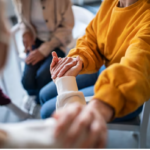To address the rising cost of substance misuse in America, the nation needs a comprehensive approach—fortunately, there are many dedicated people and organizations pursuing solutions.
Below we discuss 5 very different programs, with very different approaches to addressing the consequences and causes of drug misuse in America. Together, these initiatives are helping to discover scalable strategies to ensure healthier communities and save lives.
1. Project Lazarus
Project Lazarus is a public health program designed to help communities reduce both drug misuse and drug-related deaths, built on twin premises: that overdose deaths are preventable, and that communities are responsible for their own health. The program supports communities by giving them access to a great host of life-saving resources, including opioid overdose education, safe prescribing practices for providers, recovery support programs, chronic pain management, Naloxone (a medication used in opioid overdose resuscitation), local & state data on overdose rates, as well as local and state funding for prevention work.
The program works. In rural North Carolina, where Project Lazarus was developed and first employed, overdose rates dropped dramatically. In just the first year, overdose deaths fell from 46.6 per 100,000 people to 29. Additionally, in that same county, providers prescribed dramatically fewer opioids; in 2008, 82% of overdose decedents had been prescribed opioid analgesics. By 2010, that number fell to just 10%.
2. Bexar County Jail Diversion Program
In the last decade, people living with serious mental illnesses accounted for 16% of prison inmates, of those, 75% had an ongoing substance misuse disorder. The Bexar County Jail Diversion Program was created to divert prison inmates with severe mental health conditions from local justice systems to community treatment centers, where they can be given the care and support they need. The program also supports law officers and first responders with mental health and emotional crises training, so that they are properly equipped to de-escalate psychiatric crises.
The groundbreaking program at Bexar County has since been awarded the American Psychiatric Association’s Gold Achievement Award, the National Council for Behavioral Health’s Community Innovation Award, and the U.S. Centers for Medicare & Medicaid Services’ Health Care Innovation Award. Since the program’s creation, more than 20,000 people with serious mental illness, rather than being arrested, were identified and sent to psychiatric and substance misuse treatment. So far, the program has saved the county more than $50 million.
3. Clayton County Systems of Care
In the early 2000’s Clayton County, Georgia watched in horror as more and more of their young students piped directly from middle school and high school to prison, most commonly for relatively minor infractions. The vast majority of these students were young men of color.
In response, the local justice system and the school district formed a partnership to improve the outcomes for these young men, by helping them achieve in the classroom, create career goals, and make healthy decisions. The model is called System of Care, designed to identify at-risk students early, and then to provide each with individualized intervention treatments. While the program does seek to reduce substance misuse in students, by offering substance misuse counseling, the program also offers general mental health counseling, academic remediation, mentorship, and other essential resources to at-risk teens.
The program has shown tremendous success. In its first year, System of Care reduced the rate of in-school arrests by nearly 25%. After five years, that rate dropped by 75%.
4. Good Samaritan Laws
Surviving an opioid overdose requires quick medical assistance, unfortunately, bystanders to an overdose are often reluctant to call 911 due to fear of police involvement. In many cases, these bystanders may have been taking drugs themselves and are worried about incurring legal consequences. To reduce these barriers to dialing 911 for life-saving assistance, 40 states, along with the District of Columbia, have implemented Good Samaritan laws, most of which provide legal immunities against low-level drug offenses to the caller and to the person who overdosed. The particulars of these laws vary from state to state. In Virginia, with the most expansive Good Samaritan laws, protection is extended to almost all drug-related offenses, including the sale of drugs, whereas, in states with more limited Good Samaritan laws, calling for medical assistance on behalf of someone who has overdosed is considered a mitigating factor during sentencing.
In one recent study, Good Samaritan laws were associated with a 15% reduction in opioid overdose deaths. The study also found that these laws were not associated with any increase in opioid use.
5. Drug disposal and take-back programs
6 million Americans misused prescription drugs in 2017, and the majority of those prescription drugs were obtained from friends and family members. Drug disposal and take-back programs are designed to reduce drug misuse and overdose by preventing old prescriptions from ending up in the wrong hands. There are primarily two types of drug take-back and disposal programs: permanent collection sights, and periodic events. Permanent drug disposal locations are accessible year-round for easy disposal of old prescriptions. You can locate a drug disposal location nearest you here. The Drug Enforcement Administration also hosts National Prescription Take-Back events across the country, using temporary collection sites to safely dispose of old prescriptions.
In April, during the most recent National Prescription Take-Back Day, 6,258 such sites were set up, and together collected more than 450 tons of prescription drugs.






